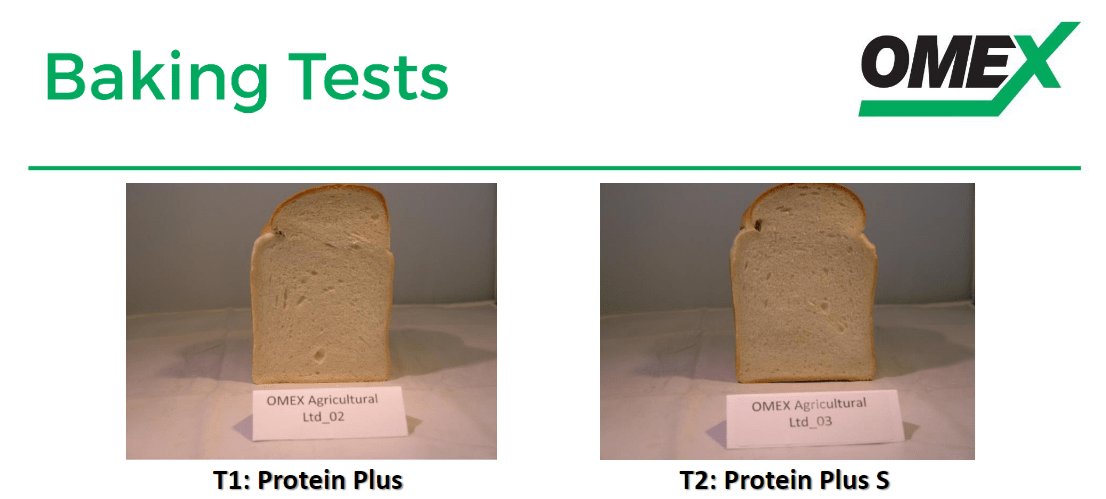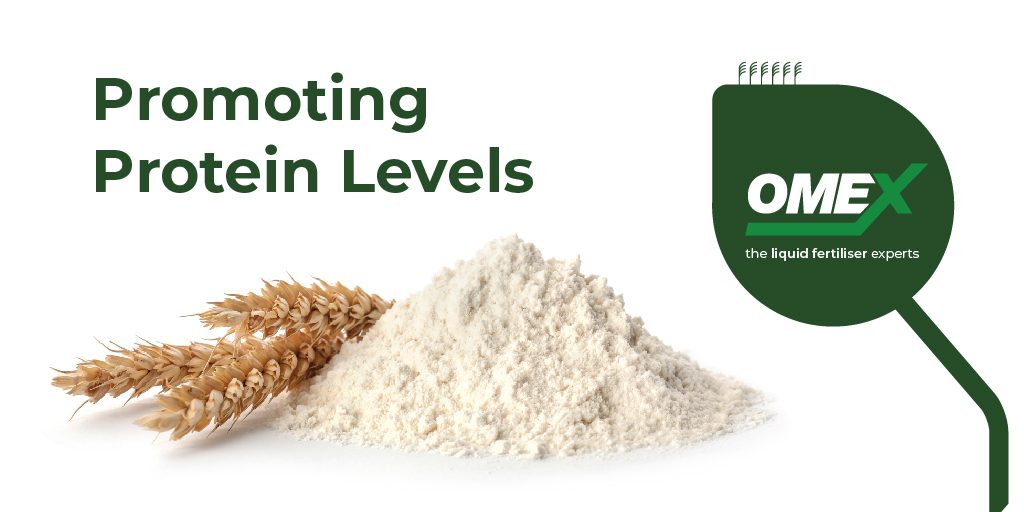When growing milling wheat, farmers need to be conscious of promoting protein levels. Protein levels for class 1 milling wheat should be in excess of 13%. Higher protein levels help the formation of gluten, holding the baked items structure and improves rheological properties of the dough.
 There have been suggestions that late foliar nitrogen does not convert into usable protein in the grain, however the above results, that were independently tested for baking quality, produced a high quality bread.
There have been suggestions that late foliar nitrogen does not convert into usable protein in the grain, however the above results, that were independently tested for baking quality, produced a high quality bread.
 This season topping up with a foliar dose of nutrition can assist in remedying sub-optimal N rates applied. Achieving class 1 status by promoting protein levels will be crucial on returning a good profit on the investment made into the crop this Spring. Growers should consider maintaining regular SAP analysis to monitor the crops performance and identify any potential nutritional deficiencies early on. The lack of N applied in crops around the country is already starting to demonstrate an issue in UK milling wheat crops. Keep in contact with your local FACTS qualified OMEX advisor who'll be able to advise you on the correct nutritional programme to meet your required yield and quality targets. You can contact you local OMEX contact, here.
This season topping up with a foliar dose of nutrition can assist in remedying sub-optimal N rates applied. Achieving class 1 status by promoting protein levels will be crucial on returning a good profit on the investment made into the crop this Spring. Growers should consider maintaining regular SAP analysis to monitor the crops performance and identify any potential nutritional deficiencies early on. The lack of N applied in crops around the country is already starting to demonstrate an issue in UK milling wheat crops. Keep in contact with your local FACTS qualified OMEX advisor who'll be able to advise you on the correct nutritional programme to meet your required yield and quality targets. You can contact you local OMEX contact, here.
Spring 22 Nutritional Analysis Trends
Latest SAP analysis nutritional trend reports are showing deficiencies of Nitrogen in wheat crops across the country, meaning crops will struggle to reach premium quality without a nutrient boost. Foliar nutrition, such as Protein Plus or Protein Plus-S, applied at GS75 (grain milky ripe) will help increase grain protein in milling wheat. Protein Plus-S has the addition of sulphur which is important during the formation of protein chains, as long protein chains help to create the stretchy quality dough that goes on to produce good load volume on baking.Promoting Protein Levels with Protein Plus
In 2015 OMEX conducted trials on Protein Plus and alternative formulations/rates of nitrogen to improve grain protein and baking quality. The protein levels and quality where monitored by Frontier Agriculture and Campden BRI. All of the applications that received a higher rate were all more effective, in line with the AHDB recommendation to apply 40 kg/ha late N for protein. In relation to yield the best performing treatments were based on Protein Plus or Protein Plus S at 200 L/ha, giving 16-19% additional yield. The below baking tests, performed by Campden BRI demonstrate the quality of bread produced. There have been suggestions that late foliar nitrogen does not convert into usable protein in the grain, however the above results, that were independently tested for baking quality, produced a high quality bread.
There have been suggestions that late foliar nitrogen does not convert into usable protein in the grain, however the above results, that were independently tested for baking quality, produced a high quality bread.
Rates and timings
Protein Plus is a concentrated foliar urea solution. It should be applied at 200 L/ha at GS75 (grain milky ripe), however if yields are expected to be sufficiently high to impact on grain protein content, the rate should be increased to 250 L/ha. Protein Plus-S should be applied at the same rate and time.National Agronomy Manager Advice
 This season topping up with a foliar dose of nutrition can assist in remedying sub-optimal N rates applied. Achieving class 1 status by promoting protein levels will be crucial on returning a good profit on the investment made into the crop this Spring. Growers should consider maintaining regular SAP analysis to monitor the crops performance and identify any potential nutritional deficiencies early on. The lack of N applied in crops around the country is already starting to demonstrate an issue in UK milling wheat crops. Keep in contact with your local FACTS qualified OMEX advisor who'll be able to advise you on the correct nutritional programme to meet your required yield and quality targets. You can contact you local OMEX contact, here.
This season topping up with a foliar dose of nutrition can assist in remedying sub-optimal N rates applied. Achieving class 1 status by promoting protein levels will be crucial on returning a good profit on the investment made into the crop this Spring. Growers should consider maintaining regular SAP analysis to monitor the crops performance and identify any potential nutritional deficiencies early on. The lack of N applied in crops around the country is already starting to demonstrate an issue in UK milling wheat crops. Keep in contact with your local FACTS qualified OMEX advisor who'll be able to advise you on the correct nutritional programme to meet your required yield and quality targets. You can contact you local OMEX contact, here. 